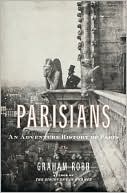

 |

|

The average rating for Parisians: An Adventure History of Paris based on 2 reviews is 4 stars.
Review # 1 was written on 2019-07-02 00:00:00 John Ness John NessAllow Graham Robb to take you to Paris of the eighteenth century and then, with several stops along the way, all the way back to the new millenium. Mr Robb says that although he came to know Paris well, he also realised that he would never really know it. Believe me, he knows it better than the likes of most of us. Allow Mr Robb to entertain you with obscure bits of information that you won't readily find in your average history or travel book. Mr Robb is an excellent tour guide. In his itinerary is included, for example: * a meeting with a young lieutenant who is destined to become very well known - Napoleon Bonaparte. * And then there is the case of The Man Who Saved Paris. This was the architect Charles-Axel Guillaumot(1730-1807), who saved Paris from literal collapse as a result of years of tunnelling and mining. After an initial catastrophic subsidence, his services were called upon. M. Guillaumot had previously been awarded the architectural Prix de Rome at the tender age of twenty. Learn how he accomplished his goal. * Most of us know that Marie-Antoinette and her family attempted an escape prior to being guillotined. Mr Robb tells us more about the escape, and how Marie-Antoinette got hopelessly lost along the way, frittering away some valuable time. Bear in mind that at this time Paris had not yet been revamped by Baron Haussmann, and was still a maze of twisted little streets. * Then there was the case of the Crayfish in which the famous (or infamous as he was a bit of both) Eugène-François Vidocq (1775-1857) pursues a notorious gang member known as the Crayfish. Vidocq is sometimes referred to as the first detective. He was particularly proficient at disguising himself, and as an ex-convict who had escaped prison several times he knew the tricks of the trade. Other Vidocq cases are also mentioned. * Meet Henri Murger (1822-1861). M. Murger was the author of Scènes de la vie de bohème which later formed the basis for two La Bohème operas, one by Ruggero Leoncavallo and the other famous one by Giacomo Puccini over which many a tear is still spilled. * Mr Robb also shows and tells us about a photograph taken in 1865 of a square that no longer exists, but he explores the area around Rue Saint-André-des-Arts in the Latin quarter (I can't believe that I stayed in that very street on my last visit to Paris) and delights with details of who where and why. In the process we also learn more about early photography. As my review is running away from me, I had better rein it in. Information follows on beloved authors such as Baudelaire, Marcel Proust, Emile Zola and his wife. Mr Robb talks about the Eiffel Tower and the Métropolitain (or métro) and the telephone which apparently was a boon to the largely home bound Marcel Proust. There was also the théâtrophone on which he could listen to opera, as well as other newfangled gadgets. "He was more pleased than he would have thought when he learned that from the very day of publication, Parisians were reading À la recherche du temps perdu in buses and trams, and even in the Métro, oblivious to their neighbours and so engrossed in the novel that when they reached the end of a sentence, the station had passed, and they had to cross to the other platform to wait for the train that would take them back to their destination." Oops, there it goes running away again! Suffice to say that our erudite tour guide talks about events, describes places as they were then and later, discusses art, music, masonic lodges (revealing some secrets about Nôtre Dame Cathedral), Pierre and Marie Curie. Mr Robb tells us about a little tour that Hitler made through the city upon the Occupation of Paris by the Germans in 1940. He also discusses several attempted assassinations on the lives of Charles de Gaulle and François Mitterand. We learn more about the student protests of 1968 and how they came about. Throughout he discusses changes to the city including the construction and impact of the Périphérique. There are plenty of people we know about and don't know about, and he more or less ends the tour with Nicolas Sarkozy. In addition to facts galore there are pages and pages of sources, a chronology, maps and pictures. This book is like a box of bonbons; I had one tidbit at a time and savoured each and every one. |
Review # 2 was written on 2011-07-13 00:00:00 Alain Brault Alain BraultRobb seems to expect you to have some idea of History and even some of the French Language so I wouldn't say the book is an easy read, but it is a very entertaining one! His habit of setting a scene without letting you know who you are looking at can be a bit annoying at times. However the stories in here are wickedly fascinating and scandal/gore factor will get even the most upstanding of readers glued to the book like rubber-neckers to a traffic accident. It's intelligent yet throws in a tiny bit of the "Springer Show's" morbid curiosity so the drab bits or descriptions that might go on a bit too long eventually reward the reader for getting through it with a real juicy bit. I'm only 2/5 through the book but already dreading when it comes to an end. |
CAN'T FIND WHAT YOU'RE LOOKING FOR? CLICK HERE!!!